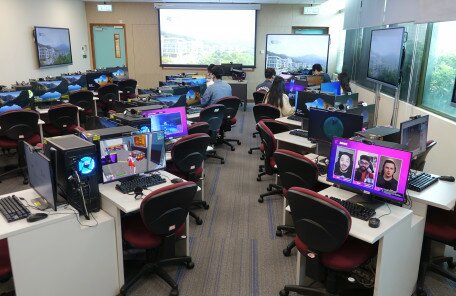教大人工智能教育實驗室
培育未來教師
Students can learn about and experience AI applications with software and training materials in the lab.
Artificial intelligence (AI) is bringing technological transformation to every sector: education is no exception. The newly launched AI Education Laboratory at The Education University of Hong Kong (EdUHK) aims to promote the learning of AI and high-performance computing at the University and ultimately in schools.
“Our role is to provide opportunities and resources for students to learn about AI applications and the underlying computing technologies,” said Professor Kong Siu-cheung, Director of Centre for Learning, Teaching and Technology (LTTC). “This will help them improve AI literacy and equip them with the technical knowledge required in their future careers. It will also inspire them to further their interest in the area through courses and training workshops offered.”
The multi-purpose lab is equipped with 40 graphic-card enabled computers, which support high-speed computing and bring much efficiency to computational tasks. It is also installed with four even-more powerful machines in a dedicated zone to cater for projects that require heavy-loading computing, such as data training in AI applications, 3-D image reconstruction and animation analysis.
Apart from supporting AI-related activities, the lab is fit for the following learning and teaching purposes:
• Virtual reality (VR)/augmented reality (AR) learning: installed with four powerful computers and VR-ready headsets, the dedicated zone allows students to explore 3-D virtual space from a first-person point-of-view, especially in art education and cultural heritage exploration. The high-performance computers in the lab facilitate experiential learning through VR/AR and support a variety of computation-intensive projects, which involve a large number of image detection, recognition, and tracking exercises.
• Game-based learning: students can learn about game design, which requires high-performance computing and complex graphic display in the lab. Computers, monitors and seats are also arranged in the way that users can sit in teams and learn about gaming through interaction with their teammates on strategies and tactics.
• Video-editing: high-performance computers can support input and output of 4K Ultra High Definition videos which are commonly used in learning and teaching. This could significantly accelerate the editing process and enable users to focus more on projects.
• Proctored examination: in addition to conducting classes, the lab is suitable for examinations, as the camera on each computer can be paired up with specific software for monitoring. The system can block access to the internet or prevent certain programs from opening. It can also identify faces of candidates through facial recognition technology.
LTTC will organise workshops to guide students who are interested in AI to reflect on how it may be applied to their own domains, including arts, information and communication technology, languages, mathematics, physical education and psychology.
Professor Kong continued, “Apart from having classes and experimental workshops for university students, we are planning to use the lab to conduct AI workshops for secondary students in May or June in 2021, and enhance the digital competency of our next generation. Some of the secondary schools have already shown interest.”




